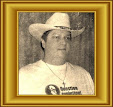There are professing Christians who falsely claim that the church fathers believed that the earth was far older than Scripture indicates, and that biblical (young age) creationists are wrong. It would be a mighty big help if they did their homework on people like Augustine.
 |
| St. Augustine in his Study, Sandro Botticelli, 1490 |
Old-earthers claim Augustine as support for figurative interpretations of Genesis 1. But what did Augustine really say? In the video series The Great Debate (watch | buy), AiG’s Ken Ham, Jason Lisle, debate astronomer Hugh Ross (of Reasons to Believe) and Bible scholar Walter Kaiser (of Gordon–Conwell Theological Seminary). Both of the latter are Christians who believe that the creation is billions of years old. The debate series was hosted by old-earth proponent John Ankerberg on his television show in early 2006.On AiG’s DVD release of the debate, AiG historian of geology Terry Mortenson offered extensive commentary from a young-earth creationist perspective. The following article is rooted in Dr. Mortenson’s commentary on Ross’s and Kaiser’s appeal to Augustine in defending old-earth ideas.
This may seem like a study for academics, but it is both interesting and relevant. To finish reading, see "Augustine on the Days of Creation".
